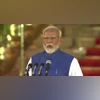Prime Minister Narendra Modi scripted history on Sunday as he took the oath of office for a third straight term, becoming the first non-Congress leader and second after Jawaharlal Nehru to achieve the feat that few thought possible for a BJP leader until he shook up national politics in 2014.
His third term, which always appeared inevitable, did not come with the massive mandate he and his party had been claiming with their typical bravado, as the Congress and its allies in the INDIA bloc fought a doughty rearguard battle to shock the BJP in its strongholds like Uttar Pradesh and Rajasthan.
It is, however, a tribute to his towering political presence that the BJP's third-best tally of 240 seats is being seen as a disappointment by the party's ardent supporters and projected as a "moral defeat" by the Congress whose own tally of 99 seats, its third worst, is being hailed by the opposition party.
The BJP-led National Democratic Alliance has won 293 seats, which Modi has noted is the biggest success for any pre-poll alliance when a single party did not get a majority.
Despite the challenges thrown by the polls, Modi, 73, remains the fulcrum around which Indian politics is bound to revolve in the coming years, while he himself will have to negotiate the sharp bends and blind turns of coalition politics for the first time since he entered the electoral politics as Gujarat chief minister in 2001.
Since leading the BJP for the first time in the Gujarat assembly polls in 2002, held in the shadow of the riots in the state following the Godhra train burning incident, Modi has never looked back, remaking the substance and sentiments of politics like few before him.
Also Read
While his detractors had written him off politically in 2002, he has gone from strength to strength, becoming a winning mix of Hindutva and development for his party.
He has been since leading his party to victory and power in 2002, 2007 and 2012 in Gujarat, and then in 2014 and 2019 at the Centre. It is though different this time as the BJP has lost majority on its own.
The prime minister is facing the strongest opposition since he first took office in 2014. Critics have also questioned his ability to set the political agenda on his terms after the opposition dented the BJP in several states, not the least in the saffron citadel of Uttar Pradesh where the SP-Congress alliance trumped the BJP-led combine.
Having seen the vagaries of politics during over a decade and a half of tenure in the BJP's organisation, Modi has presented a picture of unflappable confidence in analysing the results, making no allowances for the opposition's surprise successes in parts of the country.
That the BJP has scored an almost clean sweep of Lok Sabha polls in Odisha and won a majority in its assembly for the first time besides doubling its tally of MPs in Telangana and opening its account for the first time in Kerala, underscores the durability and wide resonance of his appeal, BJP leaders have pointed out.
As Modi takes guard for a third term with trusted and seasoned hands around him, the BJP is hopeful that he will prove his detractors wrong and continue to fuel the party's expansion horizontally and vertically with his inventive policies in government and new set of ideas in politics with the core of Hindutva, development and welfarism remaining intact.
He will soon be tested in another set of elections, this time in assembly polls in Haryana and Maharashtra, the two states where the BJP has suffered setbacks and contests are due around October.
)